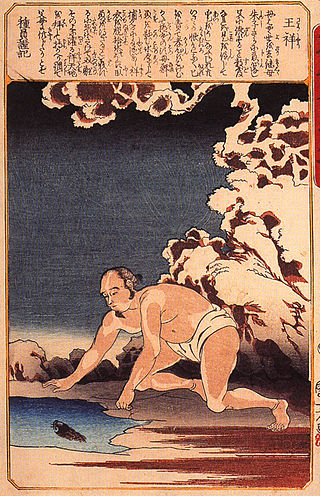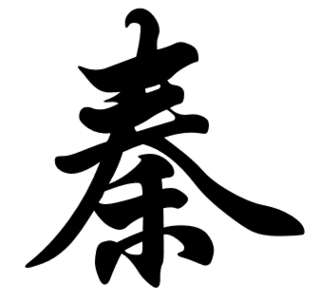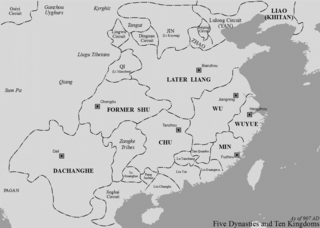
劉 / 刘 is an East Asian surname. pinyin: Liú in Mandarin Chinese, Lau4 in Cantonese. It is the family name of the Han dynasty emperors. The character 劉 originally meant 'kill', but is now used only as a surname. It is listed 252nd in the classic text Hundred Family Surnames. Today, it is the 4th most common surname in Mainland China as well as one of the most common surnames in the world.

Wang is the pinyin romanization of the common Chinese surnames 王 (Wáng) and 汪 (Wāng). It is currently the most common surname in Mainland China, as well as the most common surname in the world, with more than 107 million worldwide. It is the 8th name listed in the famous Hundred Family Surnames.

Wang Rong (234–305), courtesy name Junchong (濬冲), nickname A Rong (阿戎) was a Chinese military general, poet, and politician of the Western Jin dynasty. He was also one of the Seven Sages of the Bamboo Grove.

Wang Xiang, courtesy name Xiuzheng, was a Chinese politician who lived through the late Eastern Han dynasty (25–220), the Three Kingdoms period (220–280), and the early Western Jin dynasty (266–316) of China. He served among the highest positions in the government, including Minister of Works (司空) and Grand Commandant (太尉) in the Cao Wei state during the Three Kingdoms period, and Grand Protector (太保) during the Western Jin dynasty. He was also one of The Twenty-four Filial Exemplars.

Tang, is a Chinese surname. The three languages also have the surname with the same character but different pronunciation/romanization. In Korean, it is usually romanized also as Dang. In Japanese, the surname is often romanized as To. In Vietnamese, it is commonly written as Đường. It is pronounced dhɑng in Middle Chinese, and lhāŋ in Old Chinese. It is the 64th name on the Hundred Family Surnames poem.

Qín (秦) is a common Chinese surname. "Qin" is the hanyu pinyin romanization of the surname for Mandarin, the common dialect of China; other romanizations of the surname include Chin and Jin in Mandarin, Ceon and Cheun in Cantonese, and Tần in Vietnamese. People with this surname are most commonly found in Henan, Shaanxi, Shandong, Sichuan, Hubei and Hebei. It is the 18th name on the Hundred Family Surnames poem.
Zhang Wenli (張文禮), known as Wang Deming (王德明) during the time that he was an adoptive son of Wang Rong, was a Chinese military general and politician who initially served under the late Tang Dynasty warlord Liu Rengong and Liu Rengong's son Liu Shouwen, and later Wang Rong, the only prince of the early Five Dynasties and Ten Kingdoms period state Zhao. Wang Rong favored him for his talent and adopted him as a son. However, in 921, he encouraged Wang Rong's guards to mutiny and slaughter the Wang clan. He then took over the Zhao lands. When Wang Rong's ally Li Cunxu the Prince of Jin attacked in response, he died in shock.

Wang Chuzhi (862–922), courtesy name Yunming, formally the Prince of Beiping, was a warlord late in the Chinese Tang dynasty and early in the subsequent Five Dynasties and Ten Kingdoms period, who ruled Yiwu Circuit as its military governor (Jiedushi) from 900 and as its de jure sovereign from 910 to 921, when he was overthrown by his adoptive son Wang Du.

Tián, or T'ien in Wade-Giles is a Chinese surname. An alternative transliteration of "田" from Cantonese is Tin, from Hokkien is Thinn. It appeared in the Hundred Family Surnames text from the early Song Dynasty. It also means "field". In 2019 it was the 34th most common surname in Mainland China.
Chai is a Chinese surname. The same surname is Sài in Vietnamese, and Si in Korean.

Lu is the pinyin and Wade–Giles romanization of the Chinese surname written 陆 in simplified character and 陸 in traditional character. It is also spelled Luk or Loke according to the Hong Kong Cantonese pronunciation. Lu 陆 is the 61st most common surname in China, shared by 4.2 million people. Most people with the surname live in southern China; 44% live in just two provinces: Jiangsu and Guangxi. Lu 陸 is listed 198th in the Song dynasty classic text Hundred Family Surnames.
The Wang clan of Langya was a Chinese clan which gained political prominence during the Han Dynasty and became one of the most powerful non-imperial clans during the Eastern Jin period.
Jian is a given name of Chinese origin. Notable people with the name include:
This page is based on this
Wikipedia article Text is available under the
CC BY-SA 4.0 license; additional terms may apply.
Images, videos and audio are available under their respective licenses.








